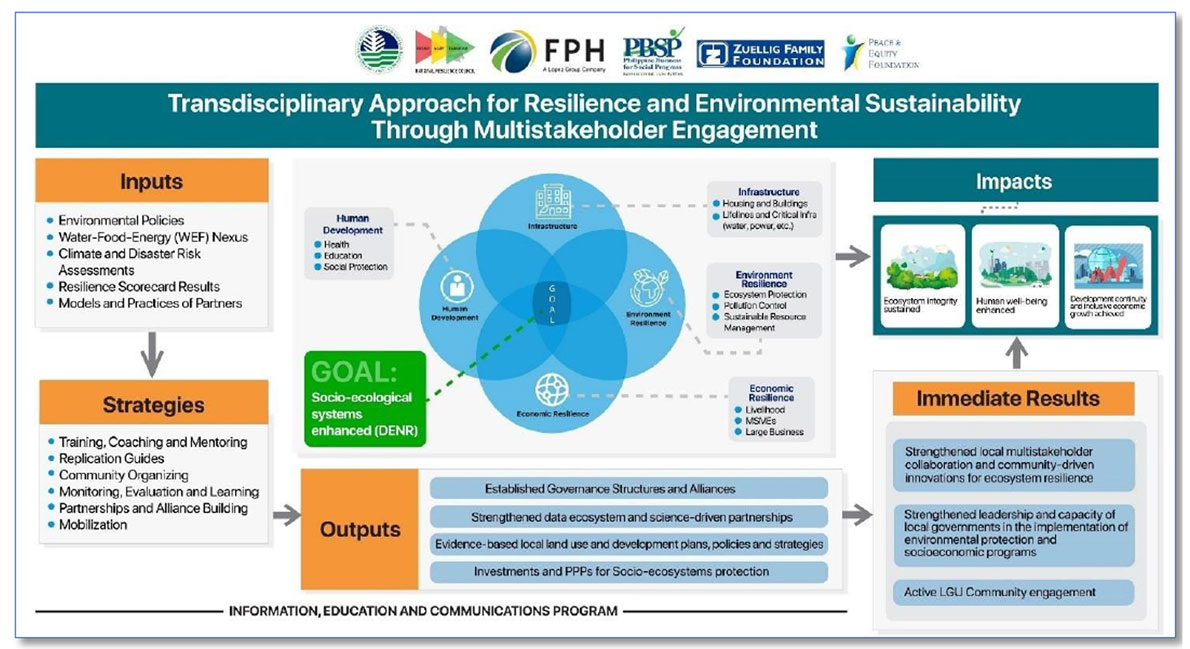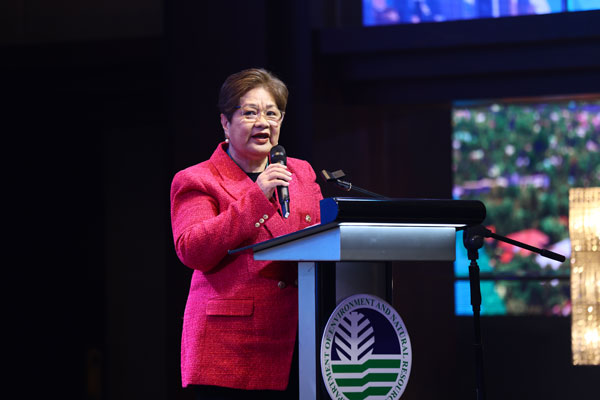With its archipelagic nature and abundance of natural resources, the Philippines is unfortunately highly vulnerable to man-made, geologic, and climate-related hazards. Located along the Pacific Ring of Fire, the country is one of the most disaster-prone nations in the world.
Agriculture, forestry, and fisheries provide a living for millions of Filipinos. However, frequent natural catastrophes, poor management, and lax environmental law enforcement threaten these vital natural resources. Air and water pollution, rising rates of urbanization, economic activities, land conversion, improper handling of plastic trash, and heightened demands on the energy and transportation sectors all contribute to increasing greenhouse gas emissions. The compounding of these hazards has led to systemic risks and threats to our entire economic and social system.
The good news is that the Department of Environment and Natural Resources (DENR) has initiated a program that converges efforts of the government, academe, private sector, and civil society on resilience and environmental sustainability for cities and municipalities nationwide—Project TRANSFORM (Transdisciplinary Approach for Resilience and Sustainability through Multistakeholder Engagement).
Introducing the Project TRANSFORM office
 In January 11, 2024, DENR Secretary Antonia Loyzaga has signed DENR Administrative Order (DAO) No. 2024-01, the administrative order for the establishment of the Project TRANSFORM Management office (PTMO) in the DENR that will focus on overseeing collaborative projects for resilience and environmental sustainability across various cities and municipalities nationwide. The PTMO is formed as the defined authority to strengthen the resiliency of communities, champion public-private partnerships, and alleviate poverty through job creation and strong collaboration with various stakeholders.
In January 11, 2024, DENR Secretary Antonia Loyzaga has signed DENR Administrative Order (DAO) No. 2024-01, the administrative order for the establishment of the Project TRANSFORM Management office (PTMO) in the DENR that will focus on overseeing collaborative projects for resilience and environmental sustainability across various cities and municipalities nationwide. The PTMO is formed as the defined authority to strengthen the resiliency of communities, champion public-private partnerships, and alleviate poverty through job creation and strong collaboration with various stakeholders.
According to the 2022 World Risk Index, the Philippines topped the list of disaster risk hotspots out of 193 countries.
Housed under the Office of the Secretary’s Special Projects and Priority Programs, the PTMO covers specific priority public-private partnership projects carried out by national government agencies and local government units (LGUs) under various contractual arrangements or schemes.
A Director and Deputy Director will lead the PTMO, which will be composed of three project monitoring units from the Central Office (COPMU), Luzon and Visayas (LVPMU), and Mindanao (MPMU). Among the functions of the LVPMU and MPMU will be to determine the issues and concerns in their areas of jurisdiction, recommend appropriate nature-based solutions, and monitor, maintain, and manage the performance of the TRANSFORM projects being implemented in their areas. On the other hand, the COPMU will serve as the overall manager of TRANSFORM projects and exercise jurisdiction over the two program monitoring units.
Meanwhile, a focal person for each DENR bureau and regional office will be assigned to ensure the effective implementation of the program.
“These programs include, but not limited to the National Greening Program, Coastal Rehabilitation, Livelihood Projects, Greenhouse Gases Inventory and Capacity Building programs,” according to the DAO.
Breaking silos
Project TRANSFORM looks into accelerating the Leadership and Governance in Resiliency of an LGU, specifically in Leadership Commitment and Competencies on Human Development, Local Economy, Infrastructure, Environment, and Human security, learn their related and existing programs, and then identify their environmental, social, and economic needs and priorities achievable through Project TRANSFORM.
 Through Project TRANSFORM, the Department aims to achieve empowered stakeholders and an integrated development planning, implementation, and evaluation. Every stakeholder group will actively partner in pursuing the resiliency pillars.
Through Project TRANSFORM, the Department aims to achieve empowered stakeholders and an integrated development planning, implementation, and evaluation. Every stakeholder group will actively partner in pursuing the resiliency pillars.
It aims to put together all the best practices from government and private sectors to deliver an inclusive, science-based, and data-driven template that all stakeholders, partners, and LGUs can use to fight the accelerating climate emergency.
 Covering a ridge-to-reef approach, the strategy involves managing forests, coastal and marine habitats, land use, solid waste, and water. Moreover, Project TRANSFORM further solidifies the country’s commitment to work together to achieve the Sendai Framework for Disaster Risk Reduction targets, the Paris Agreement, the Sustainable Development Goals, and the Philippine Development Plan 2023-2028.
Covering a ridge-to-reef approach, the strategy involves managing forests, coastal and marine habitats, land use, solid waste, and water. Moreover, Project TRANSFORM further solidifies the country’s commitment to work together to achieve the Sendai Framework for Disaster Risk Reduction targets, the Paris Agreement, the Sustainable Development Goals, and the Philippine Development Plan 2023-2028.
An offshoot of the first multistakeholder forum, Project TRANSFORM enhances the DENR’s Resiliency Framework to deliver global environmental, social, and economic gains for LGUs.
A look back
 In October 2022, the DENR held its Luzon multistakeholder forum in Manila. The three-day forum brought together representatives from the business community, non-governmental and civic groups, and academia to discuss, exchange best practices, and identify strategies and DENR priority activities. One panel discussion was participated by Ernesto Garilao, Chairman of Zuellig Family Foundation, Sly Barrameda, Executive Director of the National Resilience Council, Agnes de Jesus, Chief Sustainability Officer of First Philippine Holdings Corporation, Bob Calingo, Executive Director of Peace and Equity Foundation and Elvin Uy, Executive Director of Philippine Business for Social Progress. Moderated by DENR Undersecretary Marilou Erni, the discussion resulted in a concurrence for a project that intends to shift from the customary practice of working in silos to multistakeholder collaboration and accelerate the resiliency of LGUs.
In October 2022, the DENR held its Luzon multistakeholder forum in Manila. The three-day forum brought together representatives from the business community, non-governmental and civic groups, and academia to discuss, exchange best practices, and identify strategies and DENR priority activities. One panel discussion was participated by Ernesto Garilao, Chairman of Zuellig Family Foundation, Sly Barrameda, Executive Director of the National Resilience Council, Agnes de Jesus, Chief Sustainability Officer of First Philippine Holdings Corporation, Bob Calingo, Executive Director of Peace and Equity Foundation and Elvin Uy, Executive Director of Philippine Business for Social Progress. Moderated by DENR Undersecretary Marilou Erni, the discussion resulted in a concurrence for a project that intends to shift from the customary practice of working in silos to multistakeholder collaboration and accelerate the resiliency of LGUs.
 Thus, in January 2023, Project TRANSFORM was launched by the DENR and the implementing partners, with its pilot implementation in Ormoc City, Leyte, which will serve as a template for replication to other LGUs.
Thus, in January 2023, Project TRANSFORM was launched by the DENR and the implementing partners, with its pilot implementation in Ormoc City, Leyte, which will serve as a template for replication to other LGUs.
A look today
 To this date, Project TRANSFORM is now being implemented in the municipalities of Limay, Mariveles, and Orion in Bataan province; Ormoc City, Leyte; the municipalities of Malimono, San Francisco, and Burgos in the province of Surigao del Norte; and Antipolo city and the municipalities of Baras, Tanay, San Mateo, and Rodriguez (formerly Montalban) in Rizal.
To this date, Project TRANSFORM is now being implemented in the municipalities of Limay, Mariveles, and Orion in Bataan province; Ormoc City, Leyte; the municipalities of Malimono, San Francisco, and Burgos in the province of Surigao del Norte; and Antipolo city and the municipalities of Baras, Tanay, San Mateo, and Rodriguez (formerly Montalban) in Rizal.
 “Because every LGU has different capacities, strengths, and vulnerabilities, each needs to constantly balance hazards and exposure through evidence-informed decisions, policies, actions, and programs. We must work together to identify your high-risk priority areas, understand the root causes of vulnerability, and identify and invest in appropriate environmental protection, climate change adaptation and mitigation, and DRR strategies,” said DENR Secretary Antonia Loyzaga.
“Because every LGU has different capacities, strengths, and vulnerabilities, each needs to constantly balance hazards and exposure through evidence-informed decisions, policies, actions, and programs. We must work together to identify your high-risk priority areas, understand the root causes of vulnerability, and identify and invest in appropriate environmental protection, climate change adaptation and mitigation, and DRR strategies,” said DENR Secretary Antonia Loyzaga.
“Key to this is that local chief executives need to own both risk and opportunities that are present in each of their local governments. Having owned both, then we’ll be able to chart the ways forward for their municipalities and for the province,” she added.
Moving forward
 For the DENR, strong partnership among the environmental justice system’s pillars is critical to bridging gaps and weaknesses in climate-related policies, programs, and initiatives. Secretary Loyzaga asserted that tremendous and significant transformations to address the climate crisis are vital. Capacities and initiatives from different stakeholders should be aligned and integrated.
For the DENR, strong partnership among the environmental justice system’s pillars is critical to bridging gaps and weaknesses in climate-related policies, programs, and initiatives. Secretary Loyzaga asserted that tremendous and significant transformations to address the climate crisis are vital. Capacities and initiatives from different stakeholders should be aligned and integrated.
Through TRANSFORM, local government may move together with continuous consultation with the DENR and all the stakeholders in government, private sector, and academe. The DENR advocates for a whole-of-society approach for all investments and decision-making, with the private and civil society sectors able to complete a multi-sectoral partnership based on evidence.
The DENR continues to invite LGUs to join the project and transform Filipinos’ environment and lives through collaboration and science. This year, the DENR targets TRANSFORM to be launched and implemented in Baguio City, Quezon City, Masbate City, Palawan, Bohol, Lanao del Norte, and Sarangani Province.
 With the effective implementation of Project TRANSFORM, the Department foresees various positive, holistic impacts such as a strengthened local multistakeholder collaboration, community-driven innovations for ecosystem resilience and leadership, and a boosted capacity of local government in implementing environmental protection and anti-pollution programs. ##
With the effective implementation of Project TRANSFORM, the Department foresees various positive, holistic impacts such as a strengthened local multistakeholder collaboration, community-driven innovations for ecosystem resilience and leadership, and a boosted capacity of local government in implementing environmental protection and anti-pollution programs. ##












